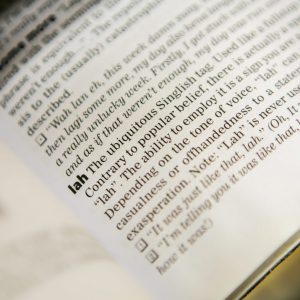Selling Singlish: Using Colloquial Singapore English (CSE) as a Marketing Tool
April 29, 2021

Formerly dismissed by the state, Colloquial Singapore English (CSE), or Singlish, is now recognised as a significant element of the Singaporean identity. Two decades ago, Singapore’s government launched the ‘Speak Good English Movement’ to encourage the use of standardised English and wean Singaporeans away from Singlish. From 2000 to 2019, themes such as ‘Speak Well. Be Understood’ (2000-2004) and ‘How You Speak Makes a Difference’ (2011-2012) were introduced to cultivate the habit of speaking good English among Singaporeans under 40. To transform Singapore into a global economic hub that is fluent in the world language of trade, various English language programmes and resources were made available to the population. However, authorities have since become more receptive of CSE and are even seen adopting it in various scenarios.
In ‘Colloquial Singapore English in advertisements’ (World Englishes, 2019), Associate Professor Mie Hiramoto (NUS Department of English Language and Literature) delves into the use of CSE as an advertising tactic to appeal to the local audience by employing visual and textual elements that are associated with the Singaporean identity. By analysing past campaigns and advertisements, A/P Hiramoto establishes that CSE is deemed to be more effective than standardised English in garnering the Singaporean audience’s attention.
In an attempt to seem more personable, several international brands have made use of CSE to identify with Singaporeans. A prominent example is McDonald’s, which titled a new menu item the ‘kiasu burger’ in 1993 and became one of the earliest marketing campaigns in the country to successfully use CSE to identify with local consumers. More global chains have since followed suit by adopting CSE to shape the audience’s perception by using terms that Singaporeans can associate with. Seeing the success of commercial businesses in building a relationship with Singaporean consumers, the government has also used CSE to convey its message to the public. During the SARS outbreak in 2003, the government released a music video ‘SAR-Vivor Rap’ starring a local comic character, Phua Chu Kang, to educate the public on essential health and hygiene practices. The rap included several Singlish terms such as lah, leh, kiasu, and keng, which sought to deliver the message to the masses.
Over time, the government has become more receptive to CSE and even employed it in media campaigns and messages. It seems that CSE is not as commonly viewed as a hindrance today; rather, it is perceived as emblematic of the country’s multi-cultural heritage. CSE continues to be commodified by businesses as an effective marketing tool to resonate with the larger Singaporean audience.
Read the full paper here.
